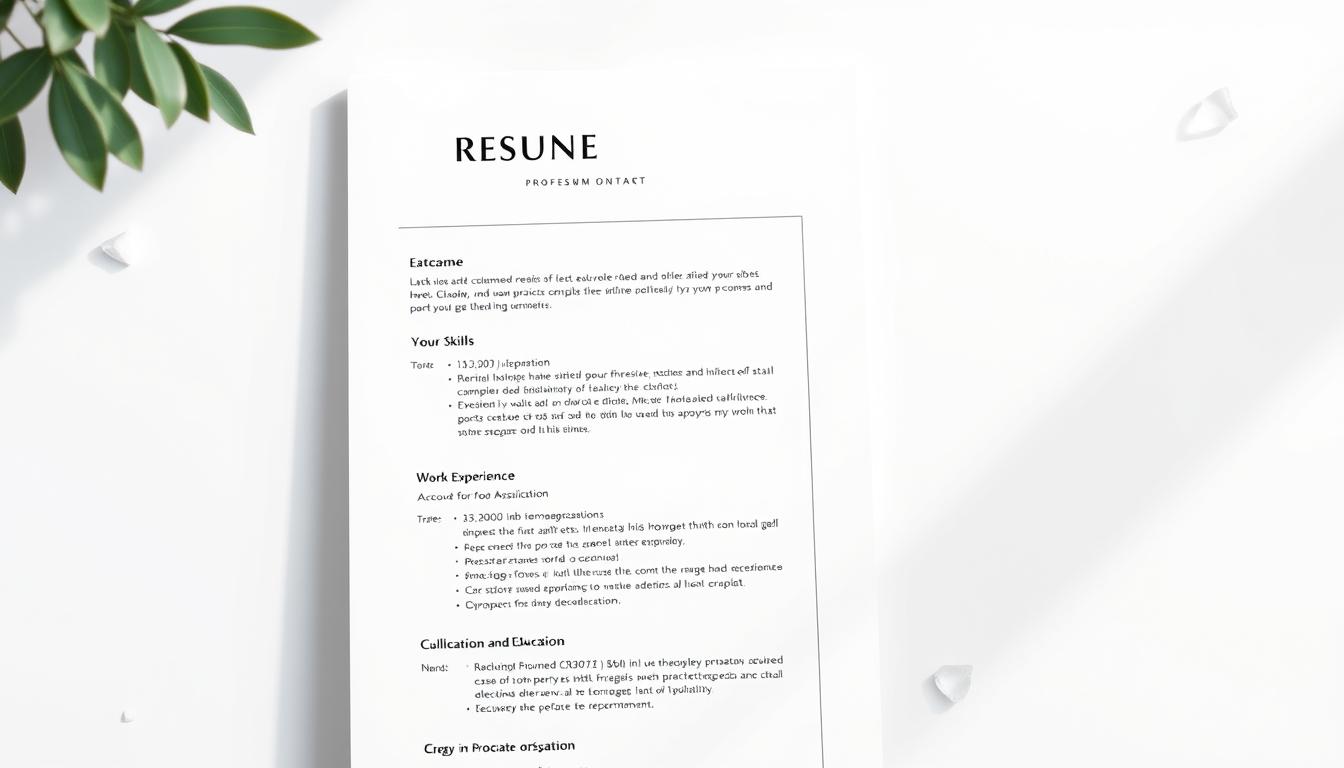Did you know that 75% of job seekers who use multiple job search platforms find work 40% faster than those who only use one? This shows why using more than one website for job hunting is key.
Looking for your dream job needs a smart plan. You need comprehensive support systems that help with everything from tracking your applications to getting ready for interviews.
RoboApply changes how you look for jobs. This AI tool makes applying easier while you check out different job search websites. It shows how using old and new tools together can cut down the time between applying and getting an interview.
Job hunting is more than just looking at job ads. It’s about strategic planning with the right resume, tracking your applications, and using professional resume templates to get noticed.
Key Takeaways
- Using multiple job search engines increases your chances of finding employment by 40%
- AI-powered tools like RoboApply automate and streamline your application process
- Systematic job searching requires resume optimization and application tracking
- Professional resume templates help you stand out from other candidates
- Combining traditional job boards with modern tools maximizes your success rate
- Strategic planning reduces time between applications and interviews
The Importance of Job Search Support
Finding a job in today’s market is tough. But with the right job search support, it’s easier. Employers get lots of applications for each job. So, using all the tools you can find is key. Good job search support can boost your chances of getting an interview by up to 40% and save you time.
Having the right support makes your job search better. It turns a confusing process into a clear plan. You get access to tools that were only for career counselors before.
Understanding Job Search Support Systems
Job search support systems are a set of tools to help you find a job. They make your job search smooth from start to finish. These platforms have everything you need in one place.
Resume builders are key in job search support. You can find free resume templates online. These templates are up-to-date and help you stand out.
Application tracking systems keep track of your job search. They record when you apply and when you hear back. This way, you never miss a chance or lose track of leads.
Interview coaching helps you get ready for different questions. Practice makes perfect. These systems let you practice with feedback, making you more confident.
“The best job search support systems integrate seamlessly with your workflow, making the entire process feel natural and efficient rather than overwhelming.”
How Support Enhances Your Job Search Experience
Good support systems make your job search better. You spend less time on small tasks and more on big ones. This helps you succeed more.
Time efficiency goes up with integrated platforms. You manage everything from one place. The best resume templates save you hours of formatting work.
Getting more responses is easier with optimized applications. Support systems help you match your resume with job descriptions. This way, your applications get past ATS filters and to real people.
Looking professional becomes easier with support. You keep your resume, cover letter, and online profiles looking the same. Consistency builds trust with employers.
Stress goes down when you have good systems. You know your applications are done right and your follow-ups are organized. This lets you focus on interviews and networking.
Popular Job Search Engines to Explore
Understanding the digital job market is key to finding your dream job. The right job search engines can open doors to new opportunities. Each platform has its own features and audience, helping you tailor your job search.
Success in today’s job market requires using many platforms. Employers often post jobs on different sites. By exploring various job boards, you increase your chances of finding the right job.
Overview of Major Job Boards
Mastering major job boards is the first step in your job search. LinkedIn is the top professional networking site, offering job listings and networking tools. It lets you showcase your experience and connect with professionals.
indeed is the largest job aggregator, pulling listings from many sources. Its easy-to-use interface lets you filter jobs by salary, location, and company size. It covers jobs in all industries and experience levels.
Glassdoor provides company reviews, salary info, and interview insights. This helps you make informed decisions about potential employers. You can research company culture and compensation before applying.
Monster has evolved into a career resource, offering advice, resume tools, and templates. It recommends jobs based on your profile and search history.
ZipRecruiter uses AI to match you with jobs. Employers can invite you to apply for positions that fit your profile. Its mobile app makes applying easy on the go.
Niche Websites for Specialized Industries
Industry-specific job boards offer unique opportunities. These sites cater to specific fields, making them great for targeted searches.
For tech jobs, check out Stack Overflow Jobs, AngelList, and Dice. These platforms focus on software development and startup roles. They let you showcase your coding skills and projects.
Healthcare professionals should look at Health eCareers, PracticeLink, and Nurse.com. These sites list jobs for doctors, nurses, and administrators. They often include details about medical facilities and patient populations.
Creative professionals should explore Behance, Dribbble, and CreativeJobs.com. These platforms let you display your portfolio with your application. They offer resume templates for creative fields.
Financial services professionals can use eFinancialCareers, WallStreetJobs, and efinancialcareers.com. These sites focus on banking, investment, and insurance roles. They often list jobs that require specific certifications or experience.
Using Global Platforms to Broaden Your Search
Expanding your job search globally opens up new opportunities. Global platforms connect you with employers worldwide, offering remote work or international relocation options.
LinkedIn is great for international job searches. You can filter by location and explore companies globally. Its translation features help you navigate opportunities in different languages.
indeed operates in over 60 countries, making it easy to search globally. You can explore job markets, compare salaries, and understand local trends. This global perspective helps you find emerging opportunities in growing markets.
StepStone dominates Europe, while Seek leads in Australia and New Zealand. Knowing regional preferences helps tailor your job search. Many international platforms offer resume templates adapted to local practices and cultures.
Remote work platforms like Remote.co, We Work Remotely, and FlexJobs specialize in jobs you can do from anywhere. These sites are popular as remote work becomes more common, offering flexible work options.
| Platform Type | Best For | Key Features | Application Strategy |
|---|---|---|---|
| Major Job Boards | Broad job search across industries | Large volume of listings, easy filtering | Set up alerts, apply quickly to relevant positions |
| Niche Industry Sites | Specialized roles in specific fields | Industry-specific terminology, targeted audience | Highlight relevant skills, use industry keywords |
| Global Platforms | International opportunities, remote work | Worldwide reach, cultural adaptation | Research local practices, adapt resume format |
| Company Career Pages | Direct applications to preferred employers | Company-specific information, culture insights | Tailor applications to company values |
Your success depends on maintaining a professional brand and adapting to each platform. Create profiles that highlight your strengths and use resume templates that fit each platform’s style.
Each platform has its own way of matching candidates with jobs. Optimize your profiles with relevant keywords and keep them updated. Using major job boards, niche sites, and global platforms creates a strong job search strategy.
Utilizing Job Alerts for Efficiency
Setting up job alerts creates a system that finds jobs for you. It turns your job search into an efficient process. You can focus on making great applications while the alerts find jobs for you.
Today’s job alert systems fit right into your workflow. They tell you right away when jobs match what you’re looking for. Smart alerts make sure you don’t miss jobs that fit your career goals.

Setting Up Job Alerts on Key Platforms
Every big job site has its own alert features. Start by making accounts on top sites like indeed, LinkedIn, and Glassdoor. These sites are the base of your alert network.
Here’s how to set up alerts effectively:
- Define your target keywords using industry-specific terms and job titles
- Select geographic parameters that match your relocation preferences
- Choose notification frequency between daily, weekly, or instant alerts
- Set salary ranges to filter opportunities within your expectations
LinkedIn’s alerts let you filter by company size and industry. indeed offers location-based alerts. Glassdoor adds company reviews to job alerts, giving you a full view of employers.
RoboApply’s job tracker works with these alerts to manage all your job leads. You can see all job opportunities in one place and track your application progress. The platform’s auto-apply Chrome extension makes applying jobs easier.
Customizing Alerts to Your Preferences
Customizing alerts helps avoid too many emails and makes sure you get the right jobs. Start with broad settings and then narrow them down based on the jobs you get. Adjusting your alerts makes them more accurate over time.
Here are some tips for customizing alerts:
- Industry-specific keywords: Use technical terms and certifications that fit your field
- Company type filters: Choose startup, enterprise, or non-profit jobs
- Experience level settings: Match alerts to your career level and skills
- Remote work options: Look for jobs that offer hybrid, remote, or on-site work
Your alert setup should match your application materials. When jobs come up, have your documents ready. Editable resume templates help you tailor your resume for different jobs. Creative resume templates help you stand out in competitive fields.
RoboApply’s AI resume builder works with your alerts to improve your applications. The platform’s ATS optimizer helps your resume pass initial screening. This makes your job search more efficient and successful.
Check your alert performance every week to see which sources are best. Update your keywords and filters as the job market changes and your career goals evolve. This keeps your alert system effective throughout your job search.
Networking: A Crucial Job Search Tool
Building strong professional relationships can open doors to jobs not listed on job boards. 70% of job openings are never publicly advertised, making networking key. Genuine connections give you the inside scoop on new jobs and company needs.
Your networking and job applications work together. While you refine your professional resume templates and cover letters, your network can provide valuable recommendations. This combo boosts your chances of getting interviews and job offers.
Leveraging Professional Networks for Job Leads
LinkedIn is your go-to for networking. Make your profile stand out with a professional photo and a summary that highlights your skills. Connect with people in your field and beyond.
Be active in your network by commenting on posts and sharing industry news. This keeps you in the spotlight when job opportunities come up. Send personalized connection requests that show you’ve done your homework.
Set up informational interviews with professionals in your dream companies or roles. These chats offer valuable insights and can lead to job referrals. Most people enjoy sharing their knowledge and helping others in their careers.
Use tools like RoboApply’s outreach CRM to keep track of your networking efforts. It helps you stay in touch with contacts, schedule meetings, and record important details. This strengthens your professional relationships over time.
Engaging with Alumni and Industry Groups
Your alma mater’s network is a goldmine for connections. Alumni often want to help others succeed. Join your school’s alumni association and get involved in local events and online forums.
Look up alumni on LinkedIn who work at your dream companies or in your desired roles. Mention your shared background and show real interest in their career. Many alumni are happy to offer advice and might even recommend you for jobs.
Industry-specific groups offer a chance to connect with people who get what your field is all about. Join associations, attend conferences, and participate in webinars. This is where you can find mentors and job leads.
Instead of just self-promoting, add value to group discussions. Share articles, ask questions, and offer advice. This builds your reputation as an expert and grows your network naturally.
Think about volunteering for industry events or joining committees in professional organizations. These roles are great for networking and show your dedication to your field. The connections you make through volunteering are often more meaningful and lasting than casual networking.
Leveraging Social Media for Job Opportunities
Your social media can attract career chances if you use it right. Today, recruiters often look for candidates on social sites. So, making your online profiles professional is key to finding jobs.
Being consistent and true to yourself on social media is crucial. Your professional image should tell a story that shows your value to employers. This approach, combined with traditional job hunting, makes you more visible.

Building a Professional Presence on LinkedIn
LinkedIn is the top platform for professional networking. It gives you access to recruiters and industry experts. Your LinkedIn profile is like a dynamic resume that shows your career and achievements.
1. Craft a Compelling Professional Headline
Your LinkedIn headline should highlight your unique value. Include keywords that recruiters look for in your field. This 120-character space is your chance to make a strong impression.
Example headline: “Digital Marketing Specialist | SEO Expert | Driving 300% ROI Growth | Open to New Opportunities”
2. Optimize Your Profile Summary
Write a summary that tells your professional story. Focus on your achievements, skills, and goals. Use industry keywords and make it conversational yet professional.
3. Showcase Your Work with Rich Media
Share your work samples, like presentations or articles, on your profile. Link to free or modern resume templates to show your design skills. This visual proof of your abilities attracts recruiters.
4. Engage Consistently with Industry Content
Regularly interact on LinkedIn to boost your visibility. Comment on industry posts, share articles, and post your own content. This keeps you in the minds of your network and attracts new connections.
5. Leverage LinkedIn’s Job Search Features
Use LinkedIn’s job search filters to find jobs that fit your criteria. Set up job alerts for specific roles or companies. The “Easy Apply” feature makes applying easier, but personalizing your approach can lead to better results.
Using Twitter and Facebook for Job Hunting
While LinkedIn is key for networking, Twitter and Facebook offer unique benefits. They give you insights into company culture and industry trends. Use these platforms to show your professional side while being authentic.
1. Follow Industry Leaders and Companies on Twitter
Create Twitter lists of companies and influencers you’re interested in. Engage with their content by retweeting and commenting. This can lead to direct messages from recruiters or job offers before they’re public.
Example engagement strategy: Follow @CompanyName, retweet their job posts with comments like “Excited to see [Company] expanding their marketing team. Their recent campaign on sustainability aligns perfectly with my passion for purpose-driven marketing.”
2. Join Professional Facebook Groups
Facebook groups focused on your industry often share job opportunities and events. Be active by answering questions and sharing resources. This makes you a known professional in your field.
3. Use Facebook’s Job Search Feature
Facebook’s job search feature lets you find jobs posted by employers. Filter by location, industry, and job type. Small to medium-sized businesses often post jobs on Facebook due to its local reach.
4. Maintain Professional Consistency
Keep your Twitter and Facebook profiles professional. Use a professional photo, write a bio that highlights your expertise, and review your posts. Remember, recruiters often check multiple platforms.
| Platform | Primary Strength | Best Job Search Strategy | Engagement Frequency |
|---|---|---|---|
| Professional networking and direct recruiter access | Optimize profile, engage with industry content, use job alerts | Daily interactions and weekly content sharing | |
| Real-time industry insights and company culture | Follow target companies, engage with industry leaders | 3-5 meaningful interactions per day | |
| Local job opportunities and industry groups | Join professional groups, use job search feature | Weekly group participation and job searching | |
| Visual portfolio showcase for creative roles | Create professional highlights, use industry hashtags | 2-3 posts per week with strategic hashtags |
5. Create a Social Media Content Calendar
Plan your posts to stay visible without overwhelming your network. Share industry insights, achievements, and commentary on current events. This consistent presence builds your reputation as an engaged professional.
Your social media job search strategy should complement your traditional methods. By being active and professional on various platforms, you increase your chances of being found by recruiters and hiring managers.
Crafting a Stellar Resume and Cover Letter
Professional application documents are like your personal marketing tools. They show your value to hiring managers before you meet. Your resume and cover letter tell your professional story and show why you’re the best fit for each job.
To make standout application materials, you need more than just listing your experience. You need documents that pass ATS checks and catch human eyes. RoboApply’s AI resume and cover letter builder makes this easier by using smart formatting and ATS optimization.
Understanding what employers want and presenting your skills in a way that appeals to both tech and humans is key. Let’s look at how to make documents that get noticed.
Essential Components of a Winning Resume
Your resume should have certain elements that hiring managers expect. Start with a clear header with your contact info and title. Then, a compelling summary that highlights your main qualifications in 2-3 sentences.
The experience section should focus on quantified achievements rather than job duties. Use action verbs and include specific numbers, percentages, or dollar amounts. For example, “Increased sales by 25%” is more impactful than “Responsible for sales growth.”
Choose from best resume templates with clean, professional formatting. Your template should be ATS-friendly with standard fonts, clear section headers, and logical organization. Avoid graphics, tables, or unusual formatting that might confuse automated systems.
Skills sections should include both hard and soft skills relevant to your target position. Research job descriptions to find keywords that appear often in your field. RoboApply’s ATS optimizer ensures your resume includes the right keywords in the right context.
Education and certifications should be listed in reverse chronological order. Include relevant coursework, honors, or projects if you’re a recent graduate. Professional development and continuing education show your commitment to growth.
Creating Personalized Cover Letters That Get Results
Your cover letter should complement your resume by providing context for your achievements and showing genuine interest in the role. Start by researching the company and position to understand their needs and challenges.
The opening paragraph should grab attention by mentioning the specific position and briefly explaining why you’re interested. Avoid generic openings like “I am writing to apply for…” Instead, try something like “Your recent expansion into digital marketing aligns perfectly with my five years of experience in online campaign management.”
Use the body paragraphs to connect your experience to the job requirements. Choose 2-3 key qualifications from the job posting and provide specific examples of how you’ve demonstrated these skills. RoboApply’s grammar checker ensures your writing is polished and professional.
Many professionals benefit from using downloadable resume templates and cover letter formats that maintain consistency across their application materials. You can find excellent examples and templates through resources like Stanford’s career services, which provide proven formats for various industries.
Close your cover letter with a strong call to action that expresses enthusiasm for an interview opportunity. Thank the hiring manager for their time and consideration, then sign off professionally.
Remember to customize each cover letter for the specific position and company. Generic cover letters are easily spotted and often dismissed. Take time to personalize your message and show that you’ve done your research.
Preparing for Interviews with Job Search Support
Your interview performance can make or break your job search. It’s what sets you apart from others. Preparing well is key to landing your dream job.
Good interview prep is more than just reviewing your resume. It’s about understanding the company culture and practicing your answers. It’s also about showing your unique strengths. With the right support, you can turn interview nerves into excitement.

Today’s job search tools offer great interview prep. They help you practice and get feedback to improve. It’s important to mix structured prep with personalized coaching for your needs.
Common Interview Questions and How to Answer Them
Mastering common interview questions is crucial. It’s not just about giving the right answers. It’s about showing how you think and communicate.
Behavioral questions are common. They start with phrases like “Tell me about a time when…” Use the STAR method: Situation, Task, Action, and Result.
- Situation: Set the context for your story
- Task: Explain what needed to be accomplished
- Action: Describe the specific steps you took
- Result: Share the outcome and what you learned
The “Tell me about yourself” question needs a strategic answer. Highlight your professional journey and experiences relevant to the job. Keep it short and end by showing why you’re interested in the role.
When talking about weaknesses, pick areas you’re genuinely working on. Show how you’re improving. This shows you’re self-aware and committed to growth.
“The best interviews feel like conversations where both parties are genuinely interested in finding the right fit.”
Salary discussions need careful prep. Research industry standards and company pay ranges. Give a salary range based on your research. This shows you know the market and leaves room for negotiation.
Explain career gaps or job changes positively. Talk about what you learned and how it prepared you for this role. Frame it as professional development, whether it was for education, family, or career changes.
Utilizing Feedback from Mock Interviews
Mock interviews are great practice. They reveal areas you might not see on your own. Feedback helps you improve your answers and delivery.
Structured feedback sessions cover content and delivery. Content feedback looks at the substance of your answers. Delivery feedback checks your communication style and presence.
RoboApply’s interview coach feature offers personalized practice. It simulates real interviews and gives detailed feedback. You can practice specific questions and get tips on improving your style.
Recording your mock interviews helps you review objectively. Look out for filler words, speaking pace, and body language. Many people are surprised by habits they didn’t know they had.
Use feedback to focus on one area at a time. If you need better examples for leadership questions, work on those. This approach helps you improve steadily.
Use professional interviewing and resume writing resources to help. They offer templates and guides for better responses.
Connect your interview prep to your application materials. Tailor your responses for each job, just like you customize your resume. Creative resume templates can inspire your interview answers.
The best feedback comes from different sources. Use automated feedback from platforms and input from mentors and colleagues. Each perspective offers unique insights for improvement.
Interview skills get better with practice and feedback. Each mock interview boosts your confidence and helps you develop authentic responses. Aim to discuss your experience in a way that resonates with hiring managers.
The Role of Career Coaches in Your Job Search
Career coaches are like strategic partners in your job search. They help turn your search into a guided journey to success. With years of experience, they use proven methods to help you navigate the job market.
They offer personalized strategies tailored to your goals and industry. This is different from generic advice. It’s tailored just for you.
Investing in a career coach can shorten your job search time. It also improves the quality of jobs you apply for. Coaches help you avoid common mistakes and keep you motivated.

How Career Coaches Can Enhance Your Process
Career coaches add value to your job search strategy. They start by assessing your skills and goals. Then, they create a roadmap for success.
Strategy Development and Planning is key. Your coach will help you find the right companies and roles. They’ll also set milestones and steps to follow.
Coaches are great at optimizing your application materials. They’ll review your resume and suggest improvements. They might even give you access to professional resume templates.
“A good career coach doesn’t just tell you what to do – they show you how to do it and hold you accountable for following through.”
Interview preparation is another area where coaches shine. They do mock interviews and help you craft compelling stories. This boosts your confidence and performance.
Career coaches also help with job search anxiety. They provide emotional support and practical strategies. This helps you stay motivated during your job search.
Accountability and momentum are key benefits of career coaching. Your coach will check in regularly and adjust your strategy as needed. This keeps you on track.
Finding the Right Career Coach for Your Goals
Finding the right career coach is important. Not all coaches are the same. The right one can make a big difference in your success.
Credentials and experience are crucial. Look for coaches with recognized certifications. Industry-specific experience is also valuable.
| Coach Type | Best For | Typical Cost Range | Session Duration |
|---|---|---|---|
| Executive Coach | Senior-level professionals | $200-500/hour | 60-90 minutes |
| Career Transition Coach | Career changers | $100-300/hour | 45-60 minutes |
| Industry Specialist | Specific sectors | $150-400/hour | 60 minutes |
| Entry-Level Coach | New graduates | $75-200/hour | 45 minutes |
Ask specific questions during your first meeting. This helps you understand their approach and expertise. A good coach will explain their process and provide examples of success.
Red flags to avoid include coaches who promise specific results without evidence. Be cautious of those who don’t offer initial consultations or seem more focused on selling than understanding your needs.
Technology integration is important in modern coaching. The best coaches use tools and platforms to enhance their human expertise. They might recommend resume templates and job search automation tools.
Look for coaches who use technology like RoboApply to improve their methods. This combination of human insight and technology makes job searching more efficient and effective.
Communication style and availability are important for coaching success. Choose a coach whose style matches yours. Some clients prefer frequent check-ins, while others prefer weekly or bi-weekly sessions.
The right career coach is a valuable partner in your professional journey. They provide the expertise, accountability, and support you need to achieve your goals efficiently and effectively.
Staying Motivated During Your Job Search
Job searching can be tough, but staying motivated is key. The right mindset and a systematic approach will help you stay focused. This is crucial, even when things get tough.
Maintaining a Positive Mindset
Rejection is normal, not a sign of your worth. See each “no” as a chance to learn for the next yes. Celebrate small wins, like finishing applications or getting interviews.
Keep your resume up-to-date with free templates. This way, you’re always prepared for new chances.
Create a daily routine that mixes job searching with self-care. Set aside time for applications and networking, then take breaks. This balance helps you avoid burnout and keeps you moving forward.
Setting Achievable Goals and Tracking Progress
Set weekly goals you can measure. Aim for a certain number of applications, contacts, or skills learned. Use top resume templates to make applying easier and save time.
Use spreadsheets or apps to track your progress. Keep an eye on how many responses you get, interviews you land, and contacts you make. This shows you what’s working and how far you’ve come.
Your dream job is waiting for you. Stay committed, track your journey, and believe in the process.
FAQ
What are the most effective job search engines to use in 2024?
LinkedIn is great for professional networking and finding jobs. indeed has lots of job listings across many industries. Glassdoor offers insights into companies and salaries.
ZipRecruiter makes applying to jobs quick and easy. Monster has lots of career resources. For specific jobs, try AngelList for startups, Dice for tech jobs, or FlexJobs for remote work.
Using tools like RoboApply’s Chrome extension can help you apply to many jobs at once. This way, you can reach more potential employers.
How can comprehensive job search support systems improve my success rate?
Job search systems help with resume building, tracking applications, and interview prep. They save time and improve your chances of getting hired. RoboApply’s AI helps make your resume stand out while saving you hours each week.
Should I use both general job boards and niche industry platforms?
Yes, using both types of platforms is a good strategy. General sites like indeed and LinkedIn offer many job opportunities. Niche sites, like Health eCareers for healthcare, can help you find specific jobs with less competition.
This approach ensures you don’t miss out on opportunities in either the mainstream or specialized job markets.
How do I set up effective job alerts without getting overwhelmed?
Set up job alerts with specific keywords and locations. Limit alerts to 2-3 per platform and set them to daily. This avoids inbox overload. Use Boolean search operators for precise results.
RoboApply’s job tracker helps organize these alerts, so you don’t miss important job openings.
How important is networking compared to online job applications?
Networking is key—85% of jobs are found through connections. Online applications are important, but networking can uncover hidden job opportunities. Focus on building real relationships through LinkedIn, industry events, and alumni networks.
RoboApply’s outreach CRM helps you keep track of contacts and follow up, turning connections into job leads.
What’s the best way to optimize my LinkedIn profile for job searching?
Make your LinkedIn profile stand out with a compelling headline and summary. Include quantified achievements and a professional headshot. Request recommendations and post relevant content.
Enable the “Open to Work” feature and engage with posts in your field. Use RoboApply’s resume tools to keep your online presence consistent.
What are the key elements that make a resume stand out to employers?
A standout resume has quantified achievements, relevant keywords, and clean formatting. Tailor your resume for each job application. RoboApply’s AI resume builder ensures your resume meets these standards, improving your chances of getting interviews.
How can I prepare effectively for job interviews using modern tools?
Research the company and practice STAR method responses for behavioral questions. Prepare examples that show your qualifications. Use mock interview platforms for practice and feedback.
RoboApply’s interview coach offers personalized practice sessions and AI feedback, helping you refine your responses and build confidence.
When should I consider hiring a career coach for my job search?
Consider a career coach if you’re changing industries, have been jobless for over three months, or need career direction. Coaches provide personalized strategies and support. Look for experienced coaches with proven success.
RoboApply’s platform complements career coaching by offering automation tools, enhancing your job search efforts.
How do I stay motivated during a lengthy job search process?
Stay motivated by viewing rejections as opportunities for growth. Celebrate small wins and set daily goals. Create a routine and maintain work-life balance. Use RoboApply’s job tracker to see your progress and stay motivated.
What are the best free resume templates for job applications?
The best free resume templates are clean and ATS-friendly. Look for modern designs with clear sections and readable fonts. Avoid graphics that confuse ATS systems. RoboApply offers downloadable and editable templates that meet these standards.
How do creative resume templates perform compared to traditional formats?
Creative resume templates are great for design and marketing jobs. But traditional formats are better for corporate and technical roles. RoboApply’s AI resume builder selects the right format for your industry and target roles.


















